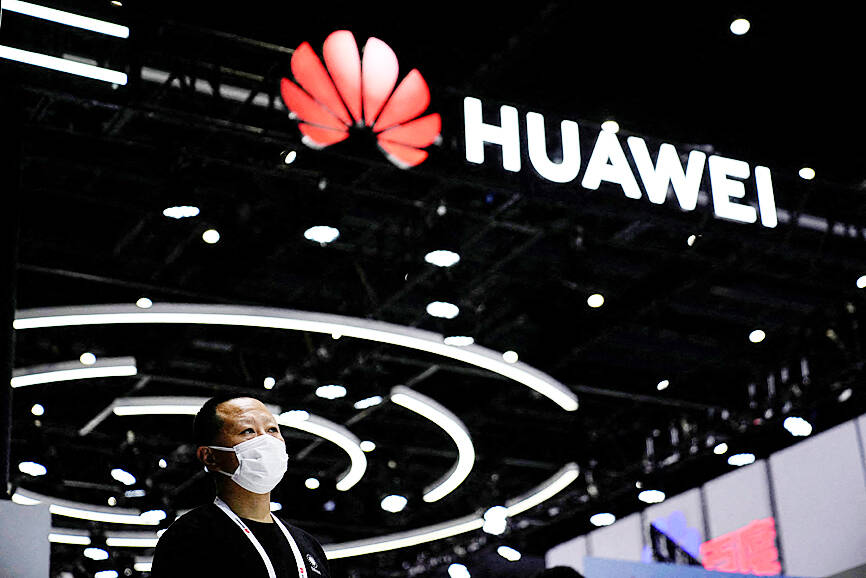Huawei Technologies Co (華為) has secured an extension to a patent licensing deal with Nokia Oyj, suggesting the Chinese company continues to lead in networking technology, despite years of punishing US sanctions.
The announcement indicates appetite for access to Huawei’s next-generation telecom patents remains strong, despite US accusations the Chinese giant poses a threat to national security. Huawei did not disclose details of the deal, saying the terms are confidential.
Huawei is trying to open up new markets and businesses, after US tech export restrictions gutted its smartphone business and curtailed the sale of advanced gear in developed markets. In response, it has begun levying royalties on the world’s biggest smartphone brands, including Apple Inc and Samsung Electronics Co, after first announcing plans to broaden its licensing business from last year.

Photo: Reuters
Huawei has signed more than 20 patent license agreements this year, covering smartphones, connected vehicles, networking and the Internet of Things, Huawei global head of IP Alan Fan said.
“In the automotive industry alone, we reached deals with around 15 car makers for use of our advanced wireless technologies, including well-known names such as Audi, Mercedes Benz, BMW, Porsche, Renault, Suzuki, Lamborghini, Subaru and Bentley,” he said in a prepared statement.
Intellectual property collaborations are among the few areas Huawei can still make significant headway in developed markets like Europe.
The UK has decided to remove the Chinese company from its 5G networks by 2027, though there has been a recent delay in certain specific restrictions.
A senior EU official last month urged countries like Germany to stop using high-risk 5G suppliers, without naming Huawei.
A series of export bans imposed during the administration of former US president Donald Trump barred Huawei from accessing an array of critical US technologies, curtailing its ability to make advanced products from smartphones to servers. That campaign against China’s tech giants expanded during US President Joe Biden’s administration, which also took aim at Chinese-made semiconductors.
Huawei’s net profit fell 40 percent in the first three quarters, although it spent heavily on research to safeguard its lead in 5G networking.
Huawei remains the biggest holder of patents in ultra-fast broadband technology, which is rapidly becoming the mainstream for mobile users around the world.
It is also seeking alternative sources of income by selling artificial intelligence and wireless communications gear to less-traditional customers from automakers to coal mines and industrial parks.

KEEPING UP: The acquisition of a cleanroom in Taiwan would enable Micron to increase production in a market where demand continues to outpace supply, a Micron official said Micron Technology Inc has signed a letter of intent to buy a fabrication site in Taiwan from Powerchip Semiconductor Manufacturing Corp (力積電) for US$1.8 billion to expand its production of memory chips. Micron would take control of the P5 site in Miaoli County’s Tongluo Township (銅鑼) and plans to ramp up DRAM production in phases after the transaction closes in the second quarter, the company said in a statement on Saturday. The acquisition includes an existing 12 inch fab cleanroom of 27,871m2 and would further position Micron to address growing global demand for memory solutions, the company said. Micron expects the transaction to

Vincent Wei led fellow Singaporean farmers around an empty Malaysian plot, laying out plans for a greenhouse and rows of leafy vegetables. What he pitched was not just space for crops, but a lifeline for growers struggling to make ends meet in a city-state with high prices and little vacant land. The future agriculture hub is part of a joint special economic zone launched last year by the two neighbors, expected to cost US$123 million and produce 10,000 tonnes of fresh produce annually. It is attracting Singaporean farmers with promises of cheaper land, labor and energy just over the border.

US actor Matthew McConaughey has filed recordings of his image and voice with US patent authorities to protect them from unauthorized usage by artificial intelligence (AI) platforms, a representative said earlier this week. Several video clips and audio recordings were registered by the commercial arm of the Just Keep Livin’ Foundation, a non-profit created by the Oscar-winning actor and his wife, Camila, according to the US Patent and Trademark Office database. Many artists are increasingly concerned about the uncontrolled use of their image via generative AI since the rollout of ChatGPT and other AI-powered tools. Several US states have adopted

A proposed billionaires’ tax in California has ignited a political uproar in Silicon Valley, with tech titans threatening to leave the state while California Governor Gavin Newsom of the Democratic Party maneuvers to defeat a levy that he fears would lead to an exodus of wealth. A technology mecca, California has more billionaires than any other US state — a few hundred, by some estimates. About half its personal income tax revenue, a financial backbone in the nearly US$350 billion budget, comes from the top 1 percent of earners. A large healthcare union is attempting to place a proposal before